|
In April 2010, it was announced that popular idol group AKB48 would churn out a semi-spin-off group called "Team Dragon" to perform a new closing theme for DragonBall Kai. Seven members, led by apparent fan Minami Takahashi, would contribute their vocals to the song, entitled "Kokoro no Hane" ("Wings of the Heart").
Needless to say, the response was mixed. We heard from the hardcore Japanese fanbase, referring to the group as one for "disgusting idol nerds". Our co-host Julian here on the site has described the group as ubiquitous in Japan. What about us here in North America that have somehow managed to avoid the deluge of AKB48 over-exposure? I dipped my toes into the J-Pop scene perhaps ten years ago, moderately keeping up with singles from Amuro Namie and the like, but never stuck around for the shift to idol groups like Morning Musume and what appears to be their successors, AKB48. My tiptoe into Sherry was not a particularly positive one, but that was at least just a random group with a random cover song — "Team Dragon" was actually going to be performing a theme song for the series.
Before diving into the music, it is almost necessary to talk about its release style and the circumstances surrounding the franchise in Japan these days. As we have discussed on the site and podcast with our buddies from Kanzentai, the franchise in terms of Japan-only performance has been taking a nose dive since 2007. Even with the production and onslaught of Kai beginning in April 2009, the franchise dropped from making ¥1228 million in Fiscal 2007 to a (comparatively) measley ¥598 million in Fiscal 2010.
How does this tie in with AKB48? To answer that question with another question: how is this anything other than a last-ditch money-grab for the franchise? Take a popular franchise on the downward spiral, do some occasional stunt-casting (namely Aya Hirano as Dende, complete with her own in-character image song on the DragonBall Kai Song Collection), and then book the current-hotness idol group to perform the new closing theme to the series, of course! It shined an unfortunate light on the song before it ever hit the television airwaves with Episode 55 on 02 May 2010.
It only made matters worse when it was announced that the CD single would be released in eleven different versions: a standard franchise release, a standard version branded with the entire group, a "Limited Edition" version branded with the entire group, seven different "Limited Edition" versions each individually branded for one of the seven different "Team Dragon" members, and one "Original Miracle Card Battle" version.
How on Earth was this going to turn out?
Title: |
"Kokoro no Hane" |
Artist: |
Team Dragon (from AKB48) |
Catalogue #: |
COCA-16397, COCA-16398, COZA-447, COZA-449, COZA-451, COZA-453, COZA-455, COZA-457, COZA-459, COZA-461, COZA-463
|
Publisher: |
Columbia Music Entertainment |
Release Date: |
21 July 2010 |
Price: |
¥1260 (Regular)
¥1600 (Limited Edition) |
Tracks: |
4 + DVD (where applicable) |
|
The review of this CD was made possible by your referral purchases on CDJapan. If you are interested in contributing to the site, please visit our "Donate" page.

Review By: Mike LaBrie (VegettoEX)
Having essentially abandoned DragonBall Kai before it even hit the Freeza story arc, I tuned in with Episode 55 to hear the return of Takeshi Kusao as Trunks, and to witness what may be a spectacular car crash with the new closing theme from "Team Dragon". I remember not being impressed... but not being turned off, either. It simply "existed", and moved me in no particular way. It took a few listens to remember the tune of the song, but other than that, I held no solid opinions about it for quite some time.
We stuck with Kai for about three more episodes here at Casa de EX, so the song only had a few more opportunities to make an impression. The pastely color scheme of the closing animation that complemented the song seemed like it might be more at place in some other modern shônen with a larger female cast (something like Bleach); they clearly did what they could with smiling faces, but stern characters like Tenshinhan, Piccolo, and Vegeta just do not mix with the style of the song at all.
It was left at that until the CD single release a couple months later.
Per my consumer-whore norm, I went with a "Limited Edition" version of the release. Since there were eleven different versions, I also made the (sad) executive decision to purchase another version. I ultimately went with the "Limited Edition" versions of the "Team Dragon" (the entire group) and "Minami Takahashi" (the leader of the group) releases. Would the packaging be any different? Would the DVD footage be any different? With the excuse that it was research for the website and review purposes, I reluctantly tossed my cash out the window.
Unfortunately for me, both versions came with identical packaging. The cover art showcases the seven-member group in attire that I would later learn was to be re-used for the song in other ways:
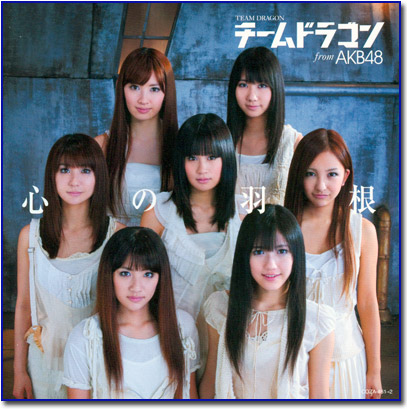
While not a part of this review, other versions of the CD single feature different cover art:
A paper slipcover folds across the spine to cover the entire back of the disc. It features the girls from "Team Dragon" posed against a building in the night sky, all looking in different directions. The track listings for the CD single and its included DVD are written in white text against the black background. The Kai logo is relegated to a tiny area of the upper-right — without taking off this slipcover, there is no indication that this product has anything to do with the franchise, what-so-ever.
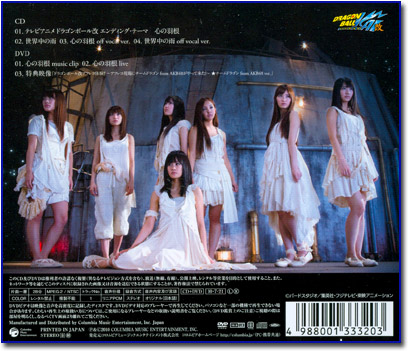
Removing the slipcover reveals the "true" back cover, however. It is a very colorful image of Goku and Gohan flying forward in the bright, blue sky with the Kai logo very prominent in the upper-left. The track listing for both the CD single and its included DVD are repeated here, as well.
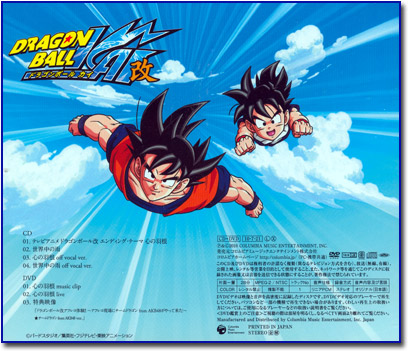
The inside of the included "booklet" is sparse and returns to the same black motif as the rest of the packaging. Lyrics for both songs are opposite each other in white text, with additional (very brief) information at the bottom of the right page.
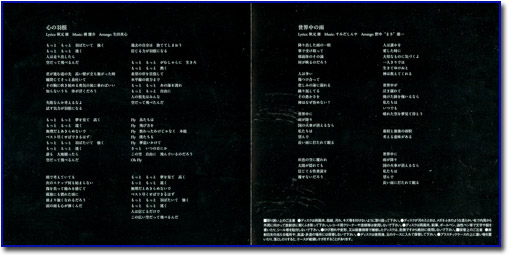
The back of the inside "booklet" showcases the group members in the same pose as the back slipcover with an English translation of some of the lyrics from "Kokoro no Hane", which itself is given an official English translation of the title as "Wings of the Heart".
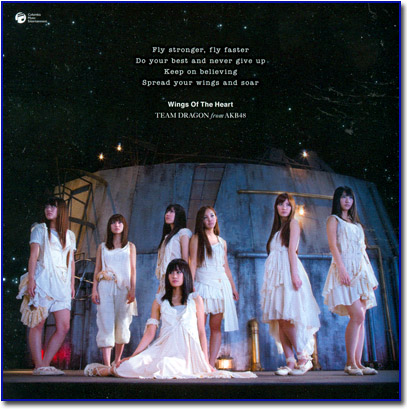
The "Limited Edition" release of the Team Dragon version (follow that so far?) came with a bonus collectible "Character Card". This particular card features a building and landscape from the official music video for the song on one side (along with the same English-translated lyrics from above), while the other side of the card features the entire group in the same pose from the CD's cover. Written both in Japanese and immediately underneath in English is a description of the events in the music video.
As noted, I also picked up the "Limited Edition" version of the Minami Takahashi version. In terms of packaging, beyond a different catalogue number, the only difference is the included card:
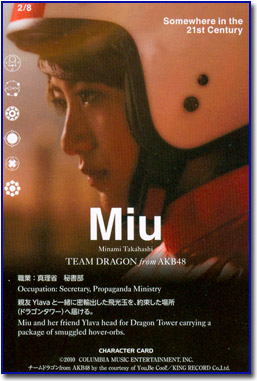
So she is a character named "Miu", apparently? Smuggled hover-orbs? Propaganda Ministry? You will read more about this later, but a complete collection of these cards may allow the consumer to figure out what the bloody Hell is actually happening in the video.
First-pressing "Limited Edition" versions of the CD single came with a poster featuring the "characters" played by each of the seven "Team Dragon" members:
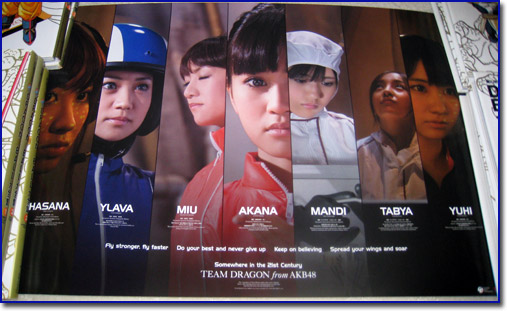
So how about that music...?
The DragonBall series has always featured "softer" songs with plenty of female vocals: they have just always been relegated to the Hit Song Collection discs in the past, fleshing out compilations as image songs. Performers like Yuka and KÛKO, and more recently "cAnON.", have certainly put the female spin on some of our favorite songs, but were always the "extra" songs.
This was a different monster, however, and was advertised as such before it ever aired.
As I noted earlier, the song left virtually no impression on me when it debuted with Kai episode 55. Rather than the song itself, I was hung up on the performance. On Twitter, I tossed out there: "First-time viewing thoughts? Totally missing the maturity and *CLASS* of veterans KUKO & YUKA."
The younger, immature performance is still a bit of a deal-breaker for me, and is something that has always rubbed me the wrong way about Kai in general: to celebrate the show's 20th anniversary, we doll it up as if it were something new...? Does not compute.
Once you move past the baggage that comes along with it, you actually do find a moderately pleasant song. It follows the traditional pop song structure perfectly without anything extra to flesh out some individuality; the expected key change with a final chorus does not even show up! The lack of individuality extends into the performance, though — I am almost entirely unable to tell the difference between any of the seven girls singing at any given time. I know that they switch off every couple lines in the verses, but I will be damned if I hear any difference between their voices. I know this is just how the Japanese idol world is, but the song is just scrubbed completely clean of any personality.
So with a song that at least holds its own as safe pop fare, does it work with the series, and would I ever associate it with the series the way I do with my yearly Hironobu Kageyama fare?
Yes and no.
It is not as if some of the current Jump super stars have not headed down this road: the first One Piece ending theme ("Memories") features a female performance that nails its concept on the head, and the third Bleach ending ("Houkiboshi") even brings in the pastely colors and female vocals, albeit with a slightly more "rock" tone. It can be done, and these other shows have proven it. So does it work for DragonBall...? In concept alone I do not think it does, but repeated viewings and listenings solidified the connection in my head, so someone was doing something right when they tossed these two things together.
That is really the best I can give the song, unfortunately. It is such a sterile composition that I can barely find any bit of arrangement to latch onto and describe. It is a perfectly fine song, but I expect more for DragonBall. It was absolutely a worthwhile experiment, but is not something I would recommend again unless the series were to receive a truly new adaptation.
The included b-side is a slower piece that features some peaceful acoustic guitar and piano work before rising up into a more powerful chorus. The arrangement backs off nicely during the verse introductions to let the vocalists shine, much more so than in the title track.
Perhaps the only additional comment I can make is that the chorus reminds me far too much of that from Izumi Sakai's (ZARD's) "Kokoro wo Hiraite". I am sure it is unintentional, but the similarities were too close for me to not immediately notice.
At just over three minutes in length, the song comes and goes without much fanfare. It has absolutely nothing to do with DragonBall (even less than the title track!), so only idol fans need apply.
Who would have guessed that there is some very subtle and funky guitar work going on during the verses? It gets completely overpowered by the vocals in the standard version, and may be the only interesting aspect of the karaoke version.
There is little to say about the second karaoke track that could not be said about its vocal version: it has some nice arrangement work going on, but is a short piece that is quickly forgotten.
The Kokoro no Hane Limited Editions come with bonus DVDs — we will focus on the Team Dragon version, but will note the Minami Takahashi version where relevant.
The DVD's first feature is the promotional music video for the title track. By itself in a vacuum, it is almost completely nonsensical. Even the collectible cards with their talk of "Dragon Tower" and "hover orbs" make almost no sense in conjunction with the music video. Without the convenience of all cards in one place to piece together the story in full, what I can gather happens is:
-
The 21st century is a pretty awful place, but idols occasionally dance atop buildings
-
The world is intricately connected via very unsophisticated technology consisting of tubes and small monitors
-
The Team Dragon girls, all apparently working for the same organization (OK, maybe a couple work at a different part of the organization doing some science stuff), secretly plot to... do something...?
-
Some of the girls become The Strangers from Dark City
-
Two of the girls drive off with a secret package
-
All seven meet up at the top of another building (but not to dance; let's not get all confused, here)
-
Each of them eat a "hover orb" and jump off the building (they may or may not be flying squirrels that wear helmets), gliding over the city below
As stated, it is crazy. Thankfully, our co-host Julian pointed out to us on Episode #0231 of the podcast that the video in its entirety seems to be an homage to Terry Giliam's film Brazil from 1985. All of the same dystopian-future visuals are carried over, and even some of the movie's plot elements (which may or may not have anything to do with the story in the Kokoro no Hane music video) are shown.
|
|
| |
|
|
|
If the video's opening is not enough to give the connection away... |
| |
|
|
The workers have a plethora of tubes, pipes, and small, generally monocromatic monitors at their desks, all piled next to each other in a row |
| |
|
|
Driving along in tiny cars |
| |
|
|
Traveling onward with a secret package |
It is about there where the similarities with Brazil seem to stop, though the overall aesthetic remains the same through to the end of the video. The girls in Team Dragon do not seem to suffer from any fantasty day-dreams of dressing up as a winged gladiator to save someone they have never met (but will meet soon), and unless the "hover orbs" are actually drugs that take them into their own little worlds within their heads... well, it is safe to say that the visual style and certain situational nods are the only things carried over from Brazil, while themes and commentary on modern information-based society are pretty much left alone. Perhaps that is for the best.
It is ultimately another DragonBall-related song that gets a music video with absolutely nothing to do with the franchise it was produced for. Technically, the song gets its own "music video" each week with the actual animation in DragonBall Kai, so there is always that to fall back on. Unfortunately, that animation (even just the TV-sized version broadcast as-is) is not present on the DVD. A creditless version of that animation seems more in line with a DragonBall Kai Blu-ray and DVD extra, but it would have been nice to include here.
The promotional video is followed-up with credits that run approximately a minute and a half in length — it is pretty long. The entire thing is presented in English, though, which is pretty neat.
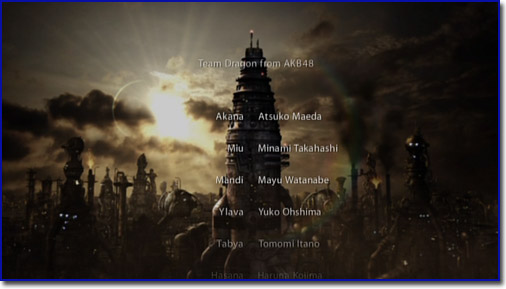
Next up is a live performance of "Kokoro no Hane" recorded on 09 June 2010 at JCB Hall in Tokyo. As to be expected, the entire performance is lip-synced. The girls are decked out in the same outfits as showcased on the CD single's packaging (and in the promotional video for the song), and the same stiff, souless, choreographed dances are used.
Finally, we are treated to the DragonBall fan's best reason for picking up one of the Limited Edition versions with a bonus DVD: a trip to the studio where DragonBall Kai is recorded! Sadly, we have to take Team Dragon along with us, but if that's what it takes to get in there...
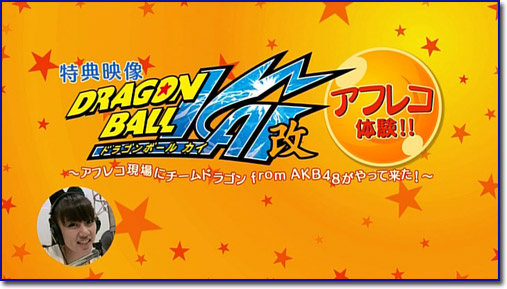
The group enters the studio, greeted by a wall plastered with DragonBall Kai promotional posters, and they make their way to the recording booth. Inside, Masako Nozawa (Goku, Gohan, etc.) and Ryo Horikawa (Vegeta) are prepping for a quick session for an episode near the beginning of Goku's fight with Vegeta... though the recording session is clearly staged, as not enough of the necessary recording crew are present, and this completed episode would have aired already. Nonetheless, it is a fun look at how differently shows are recorded in Japan with the actors and actresses together in the same room, not to mention Nozawa bouncing back and forth between her distinct voices for Goku and Gohan as if it were nothing!
The girls collectively marvel at Nozawa's iconic voice for Goku, how adorable Gohan sounds, and how commanding Vegeta's voice is. Several of them really seem to get into it as Goku powers up with his Kaiô-Ken! After the scene is complete, the girls make their way into the giant booth to meet Nozawa and Horikawa — Minami Takahashi, in particular, seems to be overwhelmed by the opportunity to meet them, clearly at a loss for words and with the most awkward bows of them all! The group banter around for a bit, but their main task is up next: actually recording lines!
The group reviews an upcoming scene (interestingly enough, a scene of filler material with first-form Cell at an airport) and its corresponding script. They test the lines along with the footage together, but they will now each individually record the same scene. We go through the batch of girls, occasionally stopping for Nozawa to pop in with guidance based on her years of experience, such as following along with the timing numbers to gague the best place to start speaking. Nozawa agrees that it can be difficult, and there is an urge to start speaking too soon. The recording ends with leader Minami Takahashi's take, which is clearly the best of the group, which all of her comrades agree on. The Team Dragon members all note that it is incredibly difficult work, and that you have to put in more emotion than in real life, but they were all glad to have done it at least once.
As a side-note, it would seem that the show's producers agreed on Takahashi's performance — she is credited (and very specifically as being from AKB48) for that particular role in episode 71 of DragonBall Kai!
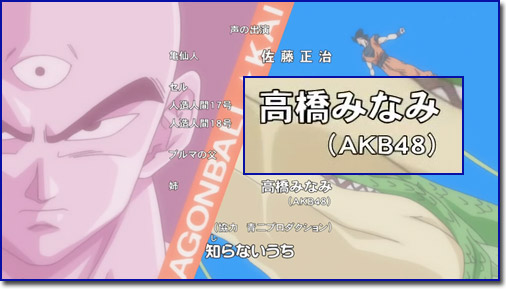
The segment of the DVD ends with some final words from Team Dragon and a short Q&A session with Nozawa.

Q. What was your first impression of Team Dragon from AKB48?
A. First of all, my first impression was, "Cute! How cute!"
Q. What did you feel as your were watching Team Dragon from AKB48 recording?
A. During the recording, I was, well, if you ask what I was watching, I was looking at their eyes. They — they really were looking intensely, and their eyes — I guess you'd say they had some real strength in their eyes. Mmhm. Everyone was really taking it seriously, giving their all and doing their best… Mmhm.
Q. About the ending animation of "Kokoro no Hane"...
A. Well, I watch every week, and… it's good, isn't it? I mean, it's "soft", and even though there's fighting, there's a part where you can relax… so I thought, "this is all right, isn't it? It's cute…"
Q. Do you have any special attitude towards Son Goku and Son Gohan?
A. Not really "special"... for me, there really isn't anything "special" about it. Although, I take it seriously, because they're equal to me. For example, in my mind, Goku and Gohan, they're there, and Goku and Gohan are equal to Masako Nozawa, because they're inside me. Every day I live with the two of them. When I come in here, even moreso.
Q. A message for the fans of Dragon Ball Kai…
A. With regards to Dragon Ball Kai, I really want as many people as possible to see it. And, well... for example, if you're watching it (motions to camera), I'd like it if you could, for starters, invite maybe 10 of the people around you to also watch. At the very least. If you do that, it will really expand in the blink of an eye, won't it? I'm wishing for that. I mean, Dragon Ball is a global phenomenon, but I want it to spread out even more, into space... yes. Yoroshiku onegaishimasu.

For just under twelve minutes of the DVD's run time (which is only one minute into the recording studio visit), the contents of the DVDs appear to be exactly the same. At this point, the Minami Takahashi version diverges slightly, as one would expect, to focusing more exclusively on her (and how absolutely adorable she finds Goku at the beginning of the series).
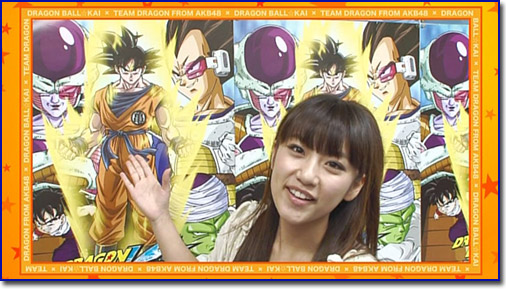
The DVD flips back to where the standard version picks up, with the entire group crashing the fake recording session and meeting the voice actors. Very quickly, though, it flips back again to focusing exclusively on Takahashi, with an extended version of only her voice acting session and reacting to how it went (her heart was beating fast!).
Rather than focusing on any of the other Team Dragon members, Takahashi gets an extended "thank you" and ending thoughts segment, though shots from the entire session are used while they speak about being featured as the performers for the latest ending theme to DragonBall Kai. Sadly, no additional footage of Masako Nozawa and Ryo Horikawa is present on this version, so those who are after more of the DragonBall-fandom side of things (rather than the idol side of things...) will almost certainly want to stay away from this type of version of the release.
Both versions of the DVD conclude with a thirty-second commercial for the first Blu-ray box and individual DVD volume of the Jinzôningen & Cell arc of DragonBall Kai, which was due for release on 02 October 2010. The commercial has no narration overtop its background music, and exclusively features footage from the arc's updated version of the opening "Dragon Soul" animation.
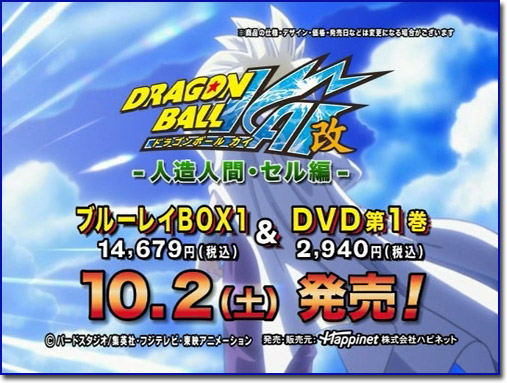
The DVDs are encoded as NTSC Region 2, interlaced, and anamorphic widescreen. The ending commercial is a part of the same video stream, and is encoded with pillar bars to create the proper 4:3 aspect ratio.
This one is a really tough call.
As of this review's (eventual!) publication, a new compilation disc containing "Kokoro no Hane" is on the horizon, so DragonBall music enthusiasts can get their fill that way alongside a plethora of other music. If you are too ashamed to or simply have no desire to jump into the manufactured idol world, that may be your best bet, never mind being the economic choice of reason.
On the other hand, those of us secure in our DragonBall fandom, perhaps to a fault, can actually find quite a bit of enjoyable content in at least one of the eleven CD singles. Though I am unable to check out each and every single last version of the release, the Team Dragon "Limited Edition" version primarily reviewed here is a beefy package. Beyond the standard CD single, the included DVD has a fantastic look behind-the-scenes with production of DragonBall Kai, and a great look at two of the greats: Masako Nozawa and Ryo Horikawa. Watching them work always brings a smile to my face, and the majority of our audience here at Daizenshuu EX will likely have the same respone.
With a toss-away b-side, standard editions of this CD single should be ruled out entirely. If you are going in, go all in: pick up the Team Dragon "Limited Edition" version. The price difference is negligible, and you get some extra DragonBall Kai content to flesh out your collection.
For another look at this CD with samples from each relevant song, check out episode #0231 of our podcast.
Kokoro no Hane is available at these online retailers:
|